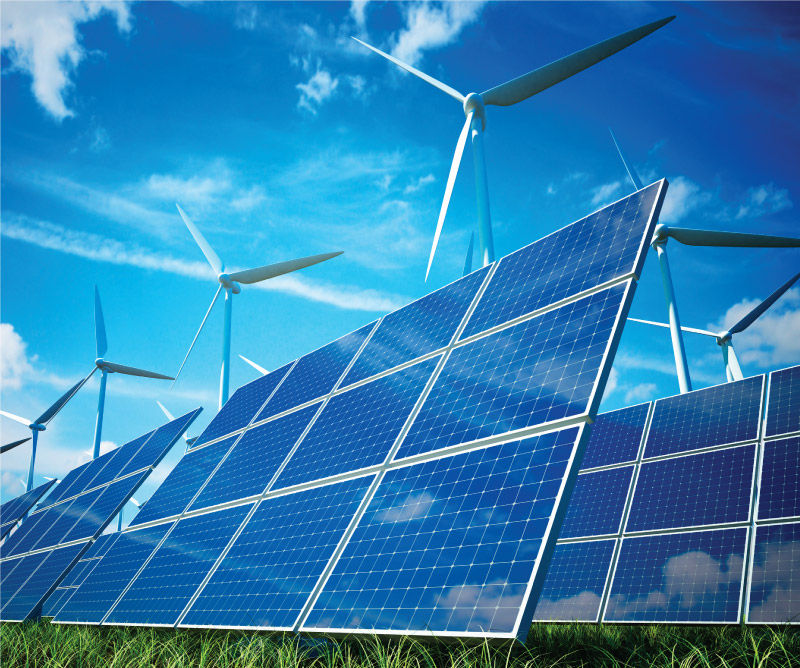Pollution Prevention
As one of Michigan’s largest employers and landowners, we understand the importance of leading by example. DTE Energy's waste reduction and recycling programs not only reduce or eliminate many types of waste, they also show our employees how they can put these sustainability ideas into practice at home.
Reuse and Recycling
Office Materials
 DTE Energy has maintained a paper and cardboard recycling program for decades. In recent years, we've expanded office materials recycling to include a wide variety of items including magazines, file folders and three ring binders. While recycling conserves renewable and nonrenewable resources, prevents pollution and is good for the environment, it's even better to use less from the start. We began a company-wide paper savings initiative in early 2009 resulting in a 19.6 percent reduction in copy paper purchased. As a result of this initiative, we expect our recycling rates to actually drop as we continue to use less paper.
DTE Energy has maintained a paper and cardboard recycling program for decades. In recent years, we've expanded office materials recycling to include a wide variety of items including magazines, file folders and three ring binders. While recycling conserves renewable and nonrenewable resources, prevents pollution and is good for the environment, it's even better to use less from the start. We began a company-wide paper savings initiative in early 2009 resulting in a 19.6 percent reduction in copy paper purchased. As a result of this initiative, we expect our recycling rates to actually drop as we continue to use less paper.
Every year in January, our employee Green Team collects thousands of holiday greeting cards and illustrated calendars. Handicapped students recycle the old cards into new cards, which we help them sell the following holiday season. The calendars go to a local nonprofit organization that works with children in school and at public events making art from recycled materials.
Investment Recovery
DTE Energy collects and sells millions of pounds of scrap metal each year, thanks to the efforts of our Investment Recovery organization. Breaking down and salvaging old materials is part of Investment Recovery's core mission. From telephones to transformers, this group finds new life for old materials, capturing reusable resources and contaminants that would otherwise be headed for landfills.
For the past 68 years, DTE Energy and Goodwill Industries have worked together to provide the services traditionally offered through DTE Energy's Investment Recovery/Salvage operation. This includes the reclamation of surplus goods and equipment, and the liquidation of surplus, obsolete and scrap materials and equipment. As of January, this affiliation has produced a new partnership that will prove beneficial to both groups, including Goodwill's Green Works' new 96,000-square-foot state-of-the-art facility at 6421 Lynch Road in Detroit. Through this partnership, Goodwill's workforce will be afforded new skills and training opportunities within the Greater Detroit area to increase future job prospects and promote individual growth. It also will allow DTE Energy to focus more on our core business while still maintaining oversight as to the disposition of materials and equipment, and significantly reduce our costs.
Industrial Recycling
DTE Energy also focuses on reuse and recycling from an industrial perspective. Examples of our efforts to embrace this commitment include:
- Finding a new use for the old bricks from the lining of the stack at our River Rouge Power Plant. The power plant replaced the lining of its stack and instead of disposing of 1.5 million pounds of bricks, we used them to create a new base for the plant's coal pile. This project prevented the brick from being sent to a landfill and offset the material resources that would otherwise have been used to create the base.
- Finding a new use for more than 220,000 pounds of rubber belting from our Monroe and Belle River Plants. Excess belting was reused rather than wasted in a landfill.
- Recycling more than 2.7 million pounds of old metal gas pipe. Our DTE Gas Natural Gas Transmission group installed new piping to improve reliability. Instead of leaving the old piping in place, we removed it and reused the material.
| Material | Amount Recycled or Reused (in pounds) | ||||
|---|---|---|---|---|---|
| 2010 | 2009 | 2008 | 2007 | 2006 | |
| Paper | 1,053,800 | 1,079,174 | 710,604 | 1,019,630 | 1,035,100 |
| Cardboard | 233,000 | 131,362 | 140,639 | 442,613 | 447,210 |
| Metal | 13,134,400 | 31,032,988 | 20,165,160 | 18,149,211 | 11,971,870 |
| Ash | 354,466,000 | 211,510,780 | 213,871,080 | 269,036,000 | 226,000,000 |
| Batteries | 76,800 | 51,291 | 79,473 | 125,130 | 21,085 |
| Bulbs | 55,000 | 62,886 | 82,614 | 245,021 | 104,769 |
| Used Oil | 2,809,274 | 3,881,498 | 3,768,494 | 3,219,862 | 4,435,582 |
| Wood | 45,600 | 677,626 | 283,033 | 107,630 | 2,790,627 |
| Rubber | 257,000 | 357,001 | 292,635 | -- | -- |
| Plastic | 127,200 | 107,117 | 18,000 | 72,100 | 16,546 |
Fly Ash Recycling

Deconstruction Activities
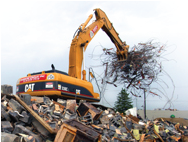 DTE Energy is a leader in the field of “deconstruction,” a process similar to demolition, except this innovative method focuses on reuse and recycling of materials within a building scheduled to be torn down or removed. This strategy considers the building materials as an asset. As the building is de-constructed, we harvest recyclable or reusable material.
DTE Energy is a leader in the field of “deconstruction,” a process similar to demolition, except this innovative method focuses on reuse and recycling of materials within a building scheduled to be torn down or removed. This strategy considers the building materials as an asset. As the building is de-constructed, we harvest recyclable or reusable material.
Our first deconstruction project in 2007 focused on a defunct DTE Energy office and warehouse space in New Hudson, Michigan. The deconstruction effort included all office furniture, building materials (mostly brick), fixtures, etc. Even the landscape vegetation was dug-up and relocated. An incredible 99.9% of the building materials were reused or recycled, 4,040,000 pounds.
Because of its continued success, DTE Energy now routinely incorporates deconstruction into the demolition bidding process.
PCB Waste Reduction
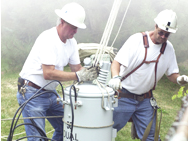
PCBs (polychlorinated biphenyls) were used for decades by electrical utilities as a fire retardant in the insulating oil used in electrical equipment.
In the 1970s, concerns were raised about the safety of PCBs. DTE Electric ceased purchasing any new PCB-containing equipment in 1976, before the passage of a law defining this substance as “toxic.”'
We removed all PCB-containing equipment from public access areas in July of 1984, four years ahead of the federal deadline. Additionally, as part of EPA Region V's PCB Phasedown program, we removed from service the 13,000 PCB capacitors in DTE Electric substations by 2004.
We continue phasing out equipment with oil that is classified as “containing” or “contaminated” by PCBs. That equipment is converted to “non-PCB” through retirement, retrofitting or replacement.
Green Fleet
To bring you the reliable energy service you need, DTE Energy uses a number of work vehicles every day. To help protect the environment, we are continuously adding alternate fuel vehicles to our Fleet Operations. As a matter of fact, nearly 11% of DTE Energy vehicles are fueled by compressed natural gas (CNG) or are electric or hybrid vehicles.
Hybrids
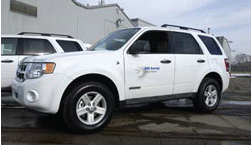 As we retire older vehicles used by DTE Energy supervisors, we are replacing many of them with Ford Escape Hybrids. These vehicles reduce our impact on the environment by lessening our reliance on gasoline and reducing CO2 emissions.
As we retire older vehicles used by DTE Energy supervisors, we are replacing many of them with Ford Escape Hybrids. These vehicles reduce our impact on the environment by lessening our reliance on gasoline and reducing CO2 emissions.
Our field operations recently began using a hybrid lift bucket truck, which can operate for up to four hours without running the diesel engine. Using only the electric lift will result in significant reduction of noise and emissions in residential neighborhoods.
Natural Gas Vehicles (NGVs)
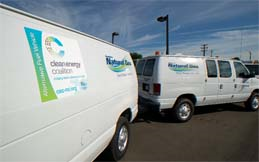 DTE Energy operates a large fleet of service vehicles across the state. These vehicles, which typically deliver low fuel-economy and really rack up the miles, gain the most from the switch to natural gas. Natural gas is the cleanest burning fossil fuel, enabling our natural gas vehicles to reduce greenhouse gas emissions by 20–29%.
DTE Energy operates a large fleet of service vehicles across the state. These vehicles, which typically deliver low fuel-economy and really rack up the miles, gain the most from the switch to natural gas. Natural gas is the cleanest burning fossil fuel, enabling our natural gas vehicles to reduce greenhouse gas emissions by 20–29%.
Natural gas vehicles not only create less greenhouse gases, fuel costs are lower, too. Those savings help us contain costs for you, our customers.
We're also supporting the infrastructure development that's so important to these fleets. We operate 12 public NGV fueling stations and are adding more stations over the next several years. We’re also lending our expertise to support others as they open their own public or private fueling stations.
Methane Reduction
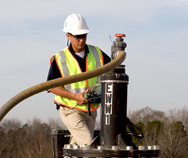 DTE Energy made an industry-leading commitment to reduce carbon emissions by more than 80 percent by 2050, largely by decreasing greenhouse gas emissions from its coal-fired electric generation plants. We are now emerging as an industry leader in reducing emissions of another greenhouse gas – methane – by more than 80 percent by 2040. Learn how in our 2018 Methane Emissions Report.
DTE Energy made an industry-leading commitment to reduce carbon emissions by more than 80 percent by 2050, largely by decreasing greenhouse gas emissions from its coal-fired electric generation plants. We are now emerging as an industry leader in reducing emissions of another greenhouse gas – methane – by more than 80 percent by 2040. Learn how in our 2018 Methane Emissions Report.
Additional Pollution Prevention
At every level of our operation, we seek to minimize waste and find new opportunities for pollution prevention. We are also members of additional voluntary pollution programs, including the Michigan Department of Environmental Quality’s Michigan Business Pollution Prevention Partnership as well as the U.S. Environmental Protection Agency’s Wastewise and Natural Gas Star programs.
